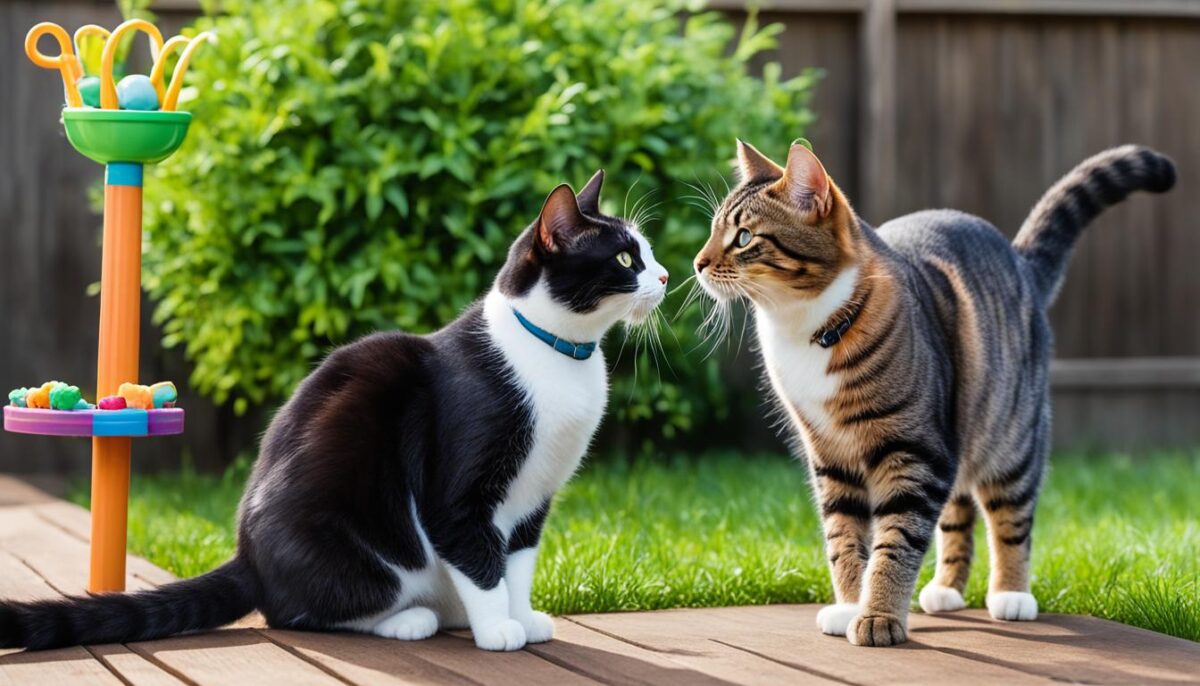Have you ever heard of FIV in cats? It’s something like human AIDS but for our furry friends. It’s a big deal because it’s a health problem that can make a cat’s body have a hard time fighting off germs. Cats with FIV, which stands for Feline Immunodeficiency Virus, may look okay for quite some time. But, over time, they can become very sick.
There isn’t a cure for this virus, so it’s important to keep cats safe to avoid it. Imagine having a friend who gets hurt easily – you’d want to protect them, right? That’s why keeping your cat indoors is a smart idea to protect them from FIV, as it usually spreads when cats get into fights and bite each other. If you have a cat that hasn’t always lived inside, it might be a good idea to check if they have FIV, just to be sure.
So, let’s learn about FIV symptoms and how to keep our cat’s health in tip-top shape. It’s like being a detective – you’re going to find out how to spot the clues that something might not be right.
Key Takeaways
- FIV in cats is similar to human AIDS, but just for cats.
- Cats might not show they have FIV right away, but they can still be sick.
- There’s no cure, but we can help our cats live happy lives even with FIV.
- Keeping cats indoors can help protect them from getting FIV.
- Testing your cat for FIV is a good step if they’ve been outside a lot in the past.
Exploring the Basics of Feline Immunodeficiency Virus (FIV)
Have you ever heard of a sickness in cats called FIV? It’s a bit like a cold that can get really bad for your furry friends. Let’s learn what FIV is, how it can hurt cats, and how many cats might have it.
What Is FIV and How Does It Affect Cats?
FIV, or Feline Immunodeficiency Virus, is a big word for a virus – that’s like a very tiny bug – that can make cats sick by making their immune system weak. That’s the part of their body that fights off germs. When it doesn’t work well, simple little germs that cats could normally say “shoo” to, can make them feel very bad.
Comparing FIV in Cats to HIV in Humans
Humans can get a similar virus called HIV, which is like a cousin to FIV. Both can be pretty sneaky because they don’t always make someone feel sick right away. But it’s important to remember that humans can’t get FIV from cats, and cats can’t get HIV from humans; they’re similar but still different.
Worldwide Prevalence of FIV and Risk Factors
Cats all around the world can get FIV, especially if they like to go outside and get into fights. In fact, about 2.5-5% of all cats in North America might have FIV. That’s like if you had a big room with 100 cats, up to 5 of them could have this virus. For cats that don’t feel good and go to see the doctor, even more could have it.
Most of the time, it’s the boy cats that haven’t been fixed and who love to explore and fight who might get FIV. If your cat stays inside and doesn’t get into fights, they are a lot safer from this virus.
Remember, by knowing the FIV basics, you can help keep your cats and feline friends happy and healthy for a long time!
Can Cats Get Aids?
Cat owners often wonder if their furry friends can get AIDS, like people do. So, let’s talk about it! First, it’s important to know that cats get a type of AIDS, but it’s not the same as the one that humans can get. In cats, it’s called Feline AIDS, caused by the Feline Immunodeficiency Virus (FIV). This virus makes a cat’s body have a hard time fighting off sick germs. While FIV can’t be passed to humans, it’s a big deal for cats.
So, how can cats catch FIV? Well, they can get it from other cats when they fight and bite. Cats with FIV can still have fun and live long lives. But it’s best if they stay inside and away from other cats who might want to fight. This helps them stay healthy and makes sure they don’t spread the virus to their cat friends.
Here are some tips to help your cat stay free from FIV:
- Keep your cat inside, safe from fights with other cats.
- If your cat spends time outside, try to keep it close to home.
- Have your cat checked by a vet for FIV, especially if they’re new to your family.
Now, let’s have a look at this picture that shows what happens when a cat has FIV:
As you can see, being kind and taking good care of our cat pals is super important. Remember, even though cats can get their own kind of AIDS from FIV, we can do a lot to help them live happy, healthy lives!
Spotting the Signs: Symptoms of FIV in Cats
When your cat gets FIV, it’s like getting a bad germ that can make it very sick. But it can be tricky to spot. At first, they may have a fever or not want to eat. Your furry friend might hide these signs, so it’s tough to tell they’re not okay. It’s important to learn about these symptoms, because knowing them can help you take better care of your cat.
Recognizing the Acute Phase
In the beginning, called the acute phase, your cat might be really tired, have a fever, or just not feel like eating. Remember, these signs can be quiet, so keep a close eye on them.
The Asymptomatic Phase in Cats
Next comes a time when your cat seems just fine. This asymptomatic phase can last for a long time, even years. During this phase, it’s like your cat’s own body is hiding the FIV symptoms, pretending everything is normal.
Indicators of the Progressive Phase and Secondary Infections
As time goes by, FIV can start causing more serious problems. This is known as the progressive phase. Your cat might lose weight, act differently, or even have seizures. They can also get other sicknesses because their body is not as strong as it used to be at fighting germs.
| Phases | Signs of FIV | Actions You Can Take |
|---|---|---|
| Acute Phase | Fever, tiredness, less appetite | Watch for changes, keep them comfortable |
| Asymptomatic Phase | Seems healthy, no signs | Regular check-ups, lots of love |
| Progressive Phase | Weight loss, strange behavior, seizures | Visit the vet, follow treatments |
Knowing these things about FIV can help you take really good care of your cat. By watching for these signs and helping them get better, you can help your cat have a happy life.
Understanding FIV Transmission Among Cats
Hey there! Did you know that when kitties go outside and meet other kitties, they might get into fights? Unfortunately, this is how they can get a sickness called FIV, sort of like a cold, but much trickier. It’s important to understand how this happens so we can help keep our furry friends safe and healthy.
The Role of Bite Wounds in FIV Spread
Here’s the scoop on how FIV passes from one cat to another: it’s mostly through biting. When cats scrap and bite, the FIV bug can jump into the new kitty’s body. That’s why bite wounds are not so great and can make them really poorly. Learning about FIV transmission helps us keep our cats safe.
Myths and Facts: Non-Aggressive Contacts and FIV
Now, just because FIV is serious, doesn’t mean we have to be scared all the time. Cats can still be friends, play, and even share their dinner without giving each other FIV. So, when your kitty is nuzzling or licking another kitty, it’s okay – those cuddles won’t spread FIV. Isn’t that a relief?
Mother to Kitten: Vertical Transmission of FIV
But there’s something else we should talk about. Sometimes, a mommy cat can pass FIV to her babies. This is especially true when she’s expecting little ones. We want all kittens to grow up strong, so it’s important for mommies to be healthy and free from FIV for their babies’ sake!
Preventing FIV: Importance of Neutering and Keeping Cats Indoors
Guess what? There are ways to help prevent FIV, and they’re pretty simple! Keeping your cat inside means they’re less likely to meet and fight with other cats. Plus, taking your kitty to a vet to get them neutered, means they won’t want to wander and fight as much. It’s all about keeping them away from trouble and keeping those kitty families healthy. Let’s give our cats the best chance to avoid cat-to-cat infection and stay well!
Diagnosing FIV: Process and Protocols
If you think your kitty might have FIV (also known as feline AIDS), your vet can check with a special test. It’s a test that looks for FIV antibodies in your cat’s blood. If the test says your cat has these antibodies, it means they might have FIV. Sometimes, cats need more than one test to make sure, because the first test can be wrong sometimes.
When vets test for FIV, they often use a **Snap Test**. It’s very quick! You can get the results in about 10 minutes, and it’s done right in your vet’s office. If the Snap Test results are hard to understand, your vet might send your cat’s blood to a lab for more tests, which is called an **IFA** or a **PCR test**. This helps the vet be really sure if your cat has FIV or not.
Remember! Kittens born to a mom with FIV may test positive because they have their mom’s antibodies. But these kittens might not actually have FIV. They should be tested again when they are older, around 6 months, to be extra sure.
Here are some things you should know about FIV tests:
- The test looks for FIV antibodies, not the virus itself.
- Kittens can show a false positive which is why re-testing is important.
- A negative test usually means your cat is FIV-free, but re-testing might be needed.
- Keep cats safe and get them tested if they’ve been in a fight!
If your cat has to get the FIV test, don’t worry. It doesn’t hurt much, just like a quick pinch. It’s just like when you get a check-up! Plus, knowing if your cat has FIV helps you take good care of them.
Keep loving and taking care of your cats, and always talk to your vet if you have questions or worries. They’re there to help keep your furry friend happy and healthy!
Managing Feline Immunodeficiency Virus
If your furry friend has been diagnosed with FIV, don’t worry. There are ways you can help them live a full and happy life. Let’s learn how to care for cats with FIV.
Treatments and Therapies for FIV-Positive Cats
There isn’t a cure for FIV, but your vet can help with treatments to keep your cat feeling good. These might include medicines to stop infections or vitamins to help their body be strong. Just like people, cats with FIV need TLC and sometimes a little extra help to stay healthy.
The Impact of Diet and Environment on FIV
Your cat’s home and what they eat can make a big difference in their health. Make sure they eat nutritious food that’s good for their immune system. Keep their home clean, safe, and cozy. A happy home can mean a healthier cat.
Routine Health Monitoring for FIV-Infected Cats
It’s important to visit the vet regularly. They will check your cat to make sure they are staying healthy and catch any problems early. Remember, you’re the best person to help your cat live a wonderful life, even with FIV.
Conclusion
If you’ve been following along, you now know a lot about FIV in cats and what it can do. Just like us, cats can get sick from viruses, and FIV is one they might catch. Remember, FIV hurts a cat’s immune system and it’s mostly spread when cats fight and bite each other. Cats with FIV can live happy lives, especially when they stay inside and away from fights.
It’s smart to get your cat tested for FIV, so you know how to best take care of them. You’ve also learned that while there’s no cure for FIV, there are ways to help cats feel well, like good food, a safe home, and lots of love. Taking care of a cat with FIV means watching for any signs of sickness and seeing the vet often.
Keep in mind, having FIV doesn’t mean a cat can’t be a great friend. By understanding FIV, you can help keep your furry buddies healthy for as long as possible. They count on you to look after them, so knowing about things like FIV is part of being a great cat friend!
FAQ
Can Cats Get a Virus Similar to HIV?
Yes, cats can get a virus similar to HIV in humans, which is called Feline Immunodeficiency Virus (FIV). It primarily affects a cat’s immune system.
What Are the Symptoms of FIV in Cats?
Symptoms can vary widely, ranging from initial fever and poor appetite in the acute phase, to no visible symptoms during the asymptomatic phase, and eventually progressing to conditions such as weight loss, seizures, and dental issues in the later stages.
How Is FIV Transmitted Among Cats?
FIV is mainly transmitted through bite wounds. It is less commonly spread from mother to kitten or through non-aggressive contact.
Can a Cat with FIV Live a Normal Life?
While there is no cure for FIV, with proper care, an FIV-positive cat can live a comfortable and lengthy life. Managing their environment, diet, and regular health monitoring are crucial.
How Can I Prevent My Cat from Getting FIV?
Keeping your cat indoors to prevent fighting with other cats and neutering your cat to reduce aggressive behavior are key strategies to prevent FIV transmission. Regular veterinary check-ups and testing can also help in early detection and management.
How Common Is FIV in Cats and Are Certain Cats More at Risk?
FIV is found worldwide, and about 2.5-5% of cats in North America are estimated to have it. Un-neutered male cats that have outdoor access and engage in fights are at a higher risk.
Can Indoor Cats Get FIV?
Indoor cats are at much lower risk for FIV because they are less likely to encounter FIV-positive cats. However, if they have not lived indoors all their life or if an infected cat is introduced to the home, they could potentially contract the virus.
Are There Different Types of FIV?
Yes, there are different strains of FIV, and some may result in more severe health effects than others.
How Is FIV Diagnosed in Cats?
FIV is diagnosed through blood tests that detect antibodies to the virus. It’s important to follow the vet’s recommendations for confirmatory testing and retesting in some cases.
What Is the Prognosis for a Cat Diagnosed with FIV?
The prognosis for a cat with FIV varies. Many FIV-positive cats live normal lives for many years with appropriate management and care, but their weakened immune system can make them more susceptible to secondary infections.
Can Other Pets or Humans Get FIV from a Cat?
No, FIV is species-specific and cannot be transmitted to humans or other pets like dogs. It is exclusively a feline virus.
Source Links
- https://www.vet.cornell.edu/departments-centers-and-institutes/cornell-feline-health-center/health-information/feline-health-topics/feline-immunodeficiency-virus-fiv
- https://www.webmd.com/pets/cats/cat-fiv-feline-immunodeficiency-virus
- https://vcahospitals.com/know-your-pet/feline-immunodeficiency-virus-infection


